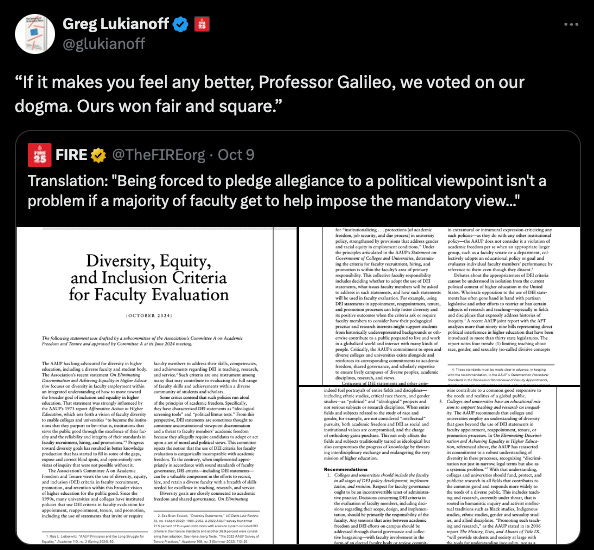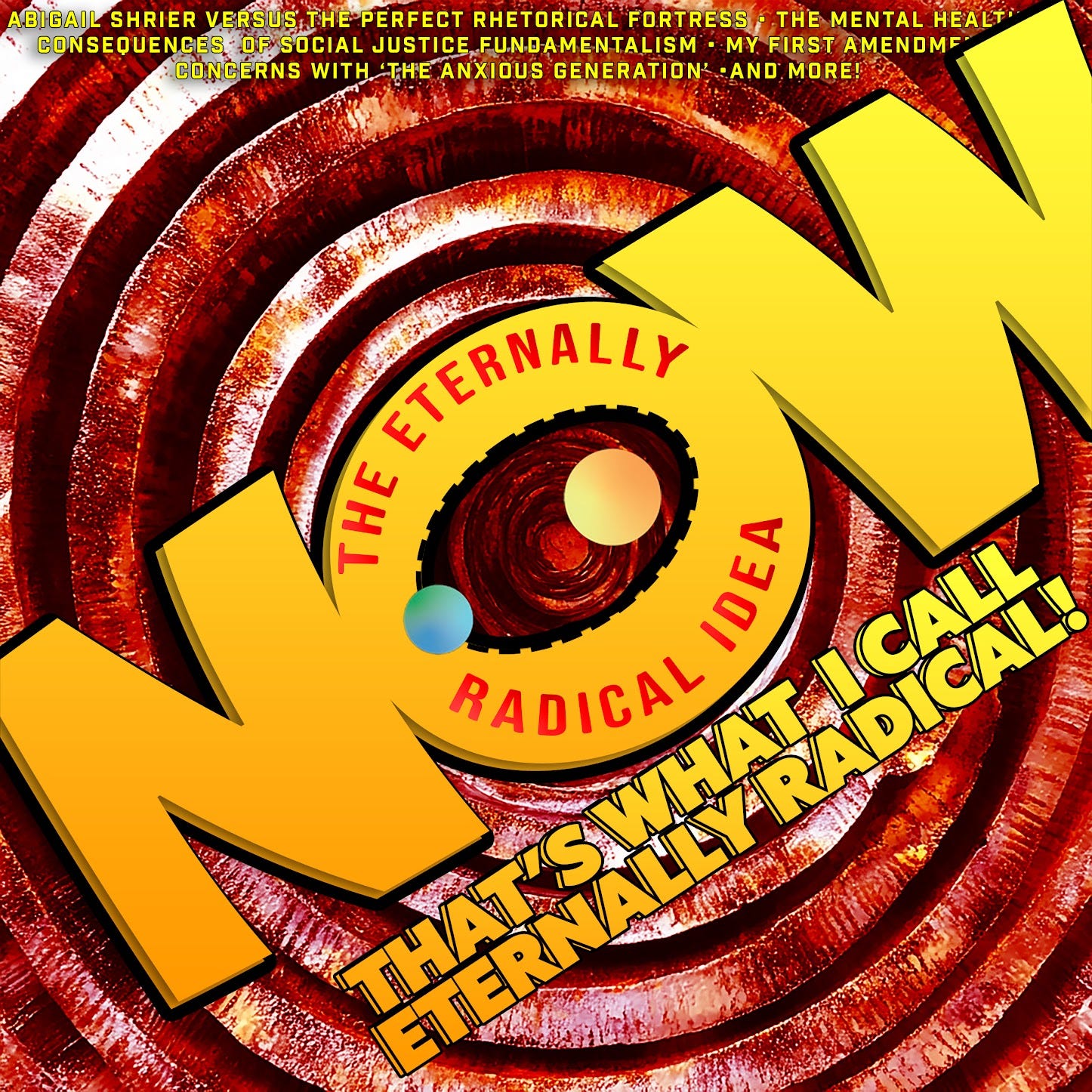AAUP endorses political litmus tests & the ‘Coddling’ documentary comes to Amazon
Bringing you the latest free speech news (10/13/24)

Story of the week
The AAUP continues to back away from academic freedom by Robert Shibley
FIRE is careful to consider each such policy individually, as not every statement requirement is the same. But in general, when employees or job applicants are required to pledge or prove their allegiance to a school’s interpretation of DEI concepts, we object precisely because ensuring that allegiance is the stated goal of the policy. From the perspective of the policy authors, that’s not a bug, it’s the key feature.
This week in FIRE’s blog
Generative AI is a neutral tool of expression, like a pen or a paintbrush. It can be used for good or ill. Persistent focus on the negatives of AI obscures its potential to enrich communication, nurture creativity, and contribute to the project of human knowledge — benefits that a regulatory panic puts at risk. Established legal frameworks for addressing specific harms like fraud and defamation are better equipped to deal with AI’s nefarious uses than imprecise laws that single out neutral expressive tools and invite serious unintended consequences.
A tale of two universities: Why South Carolina soared, and Harvard didn’t, in FIRE’s free speech rankings by Nate Honeycutt
FIREside chat with free speech advocate Nadine Strosen by Talia Barnes
Florida health department defies First Amendment, threatens to prosecute TV stations for airing abortion rights ad by Aaron Terr & Carrie Robison
Police killings worsen crisis of mob violence against Pakistan’s blasphemers by Sarah McLaughlin
University of Maryland tried to suspend the First Amendment on October 7. The Constitution doesn’t allow that by Amanda Nordstrom
This week in ERI
This week on So to Speak
This week, So to Speak host Nico Perrino had on a roundtable of FIRE colleagues (including ERI’s very own Adam Goldstein!) to talk about everything from deepfake laws to mask bans.
FIRE in the press!
Fixing Higher Education: A Profectus Roundtable (Profectus Magazine), featuring contributions from FIRE Advisory Council member Steven Pinker and yours truly, among others
Higher education needs to commit — at a new, more comprehensive level — to teaching young people to be uncomfortable with certainty and to unleash the full power of disconfirmation for truth-seeking.
It should start with an admissions essay in which students are asked to write about a time they changed their mind about something, heard someone out they disagreed with, or took seriously the possibility they might be wrong. In orientation, students should be taught the deep philosophy of academic freedom and freedom of speech, and how the search for truth can only be done by chipping away at falsity. This should be put into practice by having debates among students who are tasked to take the opposite perspective from what they believe.
More classes should be co-taught by professors who disagree with one another on fundamental issues related to the course. More research should be the product of adversarial collaborations. Students, professors, and the entire university apparatus should be structured around disproving scholarship produced not just by their own institution but by institutions the world over. These steps are a minimum that schools should take if they want to regain the trust of the public as disinterested truth seekers.
International free speech stories of the week
Chinese Authorities Harass Critics Abroad (Human Rights Watch)
Facebook, YouTube and TikTok users in Europe get forum to challenge social media content decisions (AP) by Kelvin Chan
Teachers stripped of posts for blasphemy against Islam, radicalism (Gulf News) by Ramadan Al Sherbini
London Calling: Ronnie’s First Amendment Roundup
City councils, school boards, and similar municipal bodies sure do love themselves some speech-restrictive public-comment rules, don’t they? Whether it’s purporting to ban criticism, complaints about city officials, vulgarities, profane statements, or offensive speech, or to require respectfulness or civility, there’s no shortage of ways local officials try to impose vague and/or unreasonable limits on quintessential exercises of free speech. Well, this week, the Eleventh Circuit said “enough,” reinstating a First Amendment challenge to Brevard County School Board policies against “abusive,” “personally directed,” or “obscene” remarks during public-comment periods at meetings. While the lower court had let the policies stand and granted the Board’s motion to dispose of the case, the Court of Appeals held barring “abusive” comments was unconstitutionally viewpoint based, that banning “personally directed” remarks was unreasonable and vague, and that prohibiting colloquially “obscene” language “was (at a minimum) unreasonable.” The court noted that restrictions that bar offensive or otherwise unwelcome speech are impermissible regardless of the forum in which officials seek to impose them: “Enduring speech that irritates, frustrates, or even offends is a ‘necessary cost of freedom.’” The policy against personally directed speech not only didn’t advance the goals asserted, it “actively obstructs a core purpose of the Board's meetings—educating the Board and the community about community members’ concerns.” And the less said about an “obscenity” ban that strayed far from the hard-core pornographic material the Supreme Court intended in allowing its prohibition, the better. In short, the court held, in line with FIRE’s amicus brief in the case, school boards and city councils cannot rely on unconstitutional decorum policies to quell speech with which they disagree.
Documentary of the week
This Thursday, The Coddling of the American Mind Movie hits major streaming platforms including Amazon. Courtney & Ted Balaker, the film’s amazing producers, have taken it on tour across 4 countries and 60 locations. It highlights the experiences of several students when confronted by the dominant social justice paradigm on their respective college campuses, and the detrimental effect that had on their mental health. It’s had an amazing reception on campuses across the US, and we hope it makes a big splash when it gets this wider release. If you haven’t yet had a chance to see it, keep an eye out!






The AAUP gives us a textbook example of the tyranny of the majority. Every lynch mob is direct democracy after all. Would excluding Jews be ok if the majority were in favor? Oh, I forgot, that already happened. Certainly, professors wouldn’t exclude Asians? Oops, did that too. White males? Yup. Nothing ever changes.
"The court noted that restrictions that bar offensive or otherwise unwelcome speech are impermissible regardless of the forum in which officials seek to impose them: “Enduring speech that irritates, frustrates, or even offends is a ‘necessary cost of freedom.’”"
While I am generally in agreement with FIRE and a strong defense of Freedom of Speech, this statement coming from a court seems blatantly contradictory to the existence and frequent usage of "contempt of court" against people actually in a courthouse who engage in offensive, personally directed, or obscene language before the court itself. Using "offensive or unwelcome speech" before a judge is a fast way to find yourself in worse legal trouble than you were before.
We have multiple laws that penalize disruptive conduct impairing official proceedings, do we not? In what way are these "decorum" standards dissimilar? This stance seems to be veering dangerously close to a heckler's veto of sorts, where time provided for people to express actual ideas and arguments may be diverted to screaming tantrums laden with curses and the vilest verbal abuse, derailing the proceedings and preventing the public comment period from serving its intended purpose. Freedom of Speech does not obviate the responsibility of adults to conduct themselves as mature citizens when engaging in official proceedings.